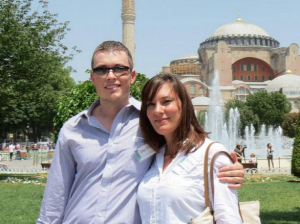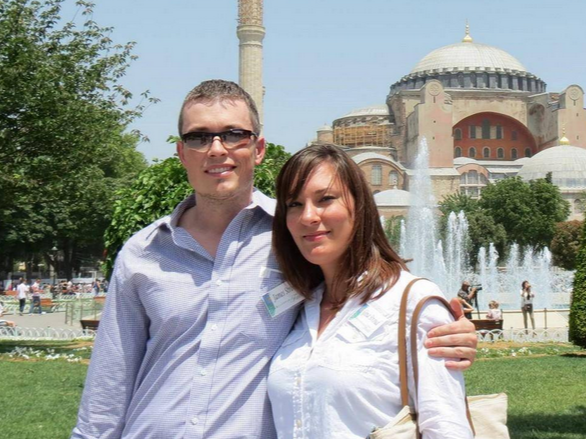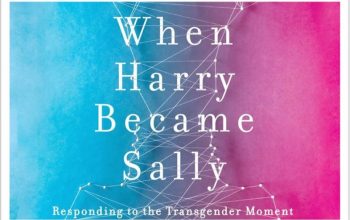The theory of Darwinian evolution has established itself as scientific fact in most of academic institutions in most the developed west. What exactly is the validity and epistemological strength of Darwinian Theory of the origin and evolution of life when viewed in perspective of philosophy of history? James Stroud discusses this question in detail in his recent book The Philosophy of History: Naturalism and Religion (Tate Publishing, 2013).

Working presently as a financial analyst, James Stroud’s background consists of Bachelor of Arts in History and Philosophy and a Masters in Ancient and Classical History. His book is a revision of his MA thesis in which he made a two-fold argument that the philosophy of naturalism is a very weak one that is most likely false and therefore the historian should not be held accountable as if it were true. Secondly, he argues that the subject of origins is much more of a historic study than a scientific one. Stroud discusses his views on naturalism and religion further in the following Q&A session.
Ernest: James, thank you for joining me for this Q&A session about the topic you discussed in The Philosophy of Religion: Naturalism and Religion. I’d first ask you to briefly tell our readers the strongest intellectual appeals of naturalism that made it the leading view in history of life-and- universe’s origin in a rather short period of time.
James Stroud: The strongest intellectual appeal of naturalism is that it is the only logical view point (or philosophy) for everything “if” any type of non-natural hypothesis is false. The problem is that naturalism by default rules out any type of non-naturalistic causation in its very definition. While I am not arguing as some type of a religious apologist nor am I trying to “prove” God exists, it goes without saying that the default position that most scholars hold is that “naturalism is true”. Take for example the beginning of the universe, usually referred to as the Big Bang; according to naturalism it simply popped into being uncaused, or it created itself, which is logically fallacious since if the universe did not exist, it could not have brought itself into existence since by doing so would have to mean it already existed. But to answer the “why” of its popularity is simply due to the fact that if one completely rules out in advance any type of non-naturalistic or design hypothesis, then all you are left with is of course “naturalism”; so it is simply because it is the default position that is rarely challenged.
Ernest: So one big question raised in your book is whether history is science. What is your answer to this question? Also, please comment on the open vs closed philosophy of history as you talk about it in detail in your book.
James Stroud: This is an interesting point and it could be asked in the opposite as well hence the term “philosophy of history”. Anything that deals with origins is non-repeatable and non-accessible by the scientific method and therefore it is by definition a “history” with scientific interpretations or philosophies placed upon them. I worked for several years in a microbiology lab for the university where we tested various antibiotics against certain strands of salmonella etc; so there was a clear usage of the scientific method; the same is completely absent from the subject of origins, which is strictly an interpretation of “history” made by non-historians based on presuppositions that naturalism is true. That is why I refer to history as a weak science in this regard.
To your question on an open-philosophy vs. a closed one, it is rather simple. I have always been told and directed even within history that “naturalism is true” and therefore this is the mode in which one must operate when doing history. This is a closed-philosophy of history because it does not allow you to take the evidence where it leads if the evidences seem to go in the direction of non-naturalistic hypotheses. My hope is that by breaking down two viewpoints of origins – one naturalistic and one non-naturalistic – it will show why an “open-philosophy” of history is the preferred measure to take because it has no presuppositions and is open to everyone. In other words, it allows one to think openly about an event without having check posts in place; check posts can of course be good in the event that one wrote a demonstrably false historical account but by arguing that naturalism is most likely false, then we certainly do not want to hold our future students in check by a philosophy or ideology that is increasingly becoming evident that it may indeed be false as I outline.
Ernest: And Naturalism, in your view, fails to explain the phenomenon of complex and intelligent life on our planet?
James Stroud: It is very difficult to explain this in such a short answer but in a very brief nutshell naturalism would have us believe that life first of all came from non-life – if we stop right here the most ardent naturalists will say, “I do not know how this could happen”; but that is only the start – then this life over millions of years developed into amphibians, reptiles, mammals, etc. with human agents all the while being the only ones to develop what philosophers call consciousness or the ability to reason and think of such questions as “why does anything at all exist instead of just nothing?” So not only can we not replicate or explain the very first step of life from non-life but we are to believe the large story that follows.
Even Francis Crick was so stumped by these findings that he said aliens must have seeded life on earth for it to start. (This is a much more plausible theory than naturalism but shows how ingrained the assumption that naturalism is true is in the minds of many). Similarly, as to the cosmological constants that permit life on earth on a razor’s edge, the naturalist today most often resorts to the mutliverse theory which basically says “if” (though there is no proof to postulate such a theory) there were billions of other universes, then our chances of a life-permitting place in the galaxy increase. Such fantastical theories are much more contrived and ad hoc in their explanation than simply alluding to an intelligence as I argued in the book:
- The fine tuning of the universe is due to either chance, necessity, or design;
- It is not due to chance or necessity;
- Therefore it is due to design.
Again if premise one and two are accurate, then 3 logically must follow and “if” we follow an open-philosophy of inquiry and history, we can really train our minds to strategically think and reason all sides of the evidence instead of completely closing off one side. Based on everything we know in all fields of study today (2013), we have no reasons based on any type of evidence to believe that the phenomenon of complex and intelligent life on our planet could have arisen by natural processes.
Ernest: From your book I learn that in your view the Bible is a more reliable source of history of origin of universe and life on earth. Would you put the Bible and other religious texts to critical scrutiny?
James Stroud: I used the Bible as a competing view against religion simply because the Bible is the only historically based religion as I outlined – and a resounding YES that the Bible or any other source should be put to critical scrutiny. The problem is the Bible has been put under scrutiny but Naturalism has not been for the most part and when you line these two up, the Bible comes out much more superior in virtually all areas of explanatory scope and power (someone else might then want to compare the Bible against Buddhism, etc). The Bible or anything else will always have some problems of course simply because we do not have the originals (nor do we with anything from ancient history). What we do know, as I outline however, is that we know the universe literally began to exist in the finite past and of all creation myths, only the biblical Genesis account spoke of a creation out of nothing while something such as the Hindu Vedas speaks of an eternal universe. While there are always weaknesses when dealing with any ancient historic text, the Bible surprisingly stands stronger today than perhaps it ever has, which is honestly astounding.
Ernest: The probability of life originating and evolving by natural selection, as generally accepted in today’s modern, secular education system, is too low to be taken as an intelligible explanation. That is what I believe is one of your book’s main points. My question is, what exactly is the probability of a supernatural being, or God as commonly remembered, creating a design of universe’s proportion while staying outside somewhere?
James Stroud: Good question – the point is that as of today, no biologist has a clue how life can originate from non-life (law of biogenesis); but as the university text book I quote from in my book explains, the naturalistic hypothesis is that though there is no reason to believe it to be true, somehow life can come from non-life give enough time and eventually grow in sentient beings like yourself. Simply alluding to time seems very weak since mathematicians state that even if we multiply the age of the universe by 1000, it still will not solve the problem nor would we have any reason to believe someone non-life would bring life into being, but this is only one leg of the argument.
When we factor in the chances of our universe being life-permitting as well as the origins of the universe coming from “nothing”, we begin to have a cumulative case against naturalism and then it simply continues to build. You ask about God being an explanation is superior – remember I am not specifically trying to “prove” God exists in the book, but when we look at it as a competing hypothesis, it does far outstrip naturalism in explanatory scope, power and less ad hoc or contrived as I outline. Either the universe popped into being out of nothing or it had a cause; either life popped into being from non-life or it was designed? Again when we allude to “God”, remember the simple logic I put forth:
- If the universe began to exist, it had a cause.
- The universe began to exist.
- Therefore the universe has a cause.
Now this cause must be outside of space/time/matter so “God” seems like a decent candidate but it could be an alien or anything else but it is inescapable that this being is not naturalistic because by default it is outside of nature. (If premise 1 and 2 are true, then 3 must logically follow.)
Ernest: One question I am inclined to ask is whether you think the failure of naturalism to explain origin of life or the phenomenon of consciousness automatically leads us to believe in theism?
James Stroud: Not at all – a form of deism might be the more plausible venue that follows from the conclusion that naturalism is false? Or perhaps a more Buddhist type philosophy is the answer? My point being that naturalism is most likely false and therefore all of these “other” options that are non-naturalistic should be open as if they were possibly true since “if” naturalism is false, then non-naturalism could be true. As a historian I am forced to use the Bible (Judaic/Christian theism) since it is the only religion based on history (as I outline in the book) as opposed to depictions of gods battling, etc. that are simply unverifiable by the historic or scientific method. They may be true, but they are simply unable to be analyzed via historic methodology as the Bible is.
Ernest: In your book, you have expressed serious and repeated criticism of the authoritarian manner of validating naturalism in our modern, western education system. Who do you think is benefiting from this policy?
James Stroud: I honestly cannot see why anyone would want to limit their hypotheses to only a few select groups; similarly I do not want less naturalism taught; I want more taught simply because the strengths and weaknesses of any theory need to be flushed out and explored. As I outline in the book, many groups such as the ACLU have taken to the court systems in order to insure that weaknesses to Darwinian naturalism (for example) are not taught to students. Why would you need to go to the courts instead of just show proof, and moreover, why would you want to? If everything I have written in this book is false I most certainly want to hear about it.
Paradigms are very difficult to challenge once in place; as I outlined in the book, whether this is a closed-philosophy held by the Church of its day to the naturalistic one today, both were paradigms that would do anything they had to in order to keep their status quo. Similarly, today if naturalism is challenged, it literally would challenge everything we think concerning science and moreover the philosophy of science, and would thus roll over into history, sociology, anthropology, etc, etc. These are the main groups that are “benefiting” though that may not be the best word, from the current worldview in place. Again though if 2+2 does not equal 5 then why in the world would someone want to potentially endorse laws that force students to accept 5 as the answer without question?
Ernest: Near the end of your book (page 276), you state that people are growing more and more nonintellectual in our time. Do you specifically mean believers in naturalism are lacking intellectual talent? And what reason accounts for lack of intellectual insight despite more advanced learning systems in our age?
James Stroud: If we look at any standardized testing groupings in our modern day, they are woefully lower than they were even in the 1950s, which really should not be the case. Similarly I have debated many professionals on these topics as well as students who have not thought through these via “reason or logic.” A common answer is “my text book says so,” or “my instructor says so,” and that is why I try to encourage people to think on their own and be able to justify their answers even if they completely disagree with me. I do not believe even naturalistic professors will disagree with me that the standardized scoring of high school and college students are woefully lower today than they were; similarly if a naturalistic philosophy would allow their strengths as well as their weaknesses to be taught, it would help students better take the evidence where it leads instead of retarding one’s education by setting up parameters that are simply “off limits so believe it and don’t ask any questions.”
Ernest: So what has been the response of those who have read your book?
James Stroud: The responses have mostly been positive even by critics. I have spent some time communicating back to graduate students and professors from the United Kingdom as well as the United States who said I “was completely wrong” in my analysis but when I would ask them “what specifically did I say that was false?” They have yet to cite me even one instance, even though I’m sure I am probably wrong in one or two areas potentially.
One graduate student said I was completely wrong so I asked if they believed the universe was eternal or that it simply popped into existence and they have acknowledged that I was correct here and in the fine-tuning; some might adhere to the mutliverse hypothesis but when I begin asking them about it, they rarely know much about it other than that they read it somewhere. I have literally begged many naturalists to provide me with reasons of their own for why naturalism is true; to provide some reasons for it which as of yet not one single professor or graduate student has even attempted to provide me with a few arguments in favor of naturalism nor have they specifically provided me with an example where I am false – just that I am “wrong” and they do not need to tell me “why” I am wrong? Similarly many have asserted that though they cannot prove me wrong in any specific areas, they are confident that in the future I will be, which may be true but as of today (2013), it seems that even naturalists have no real reasons “for” believing naturalism to be true.
Ernest: Do you feel hopeful that the Internet and growing number of independent small presses would help improve young people’s intellectual abilities?
James Stroud: To a degree, most definitely. The problem is “politics” of course. Texas for example is the country’s largest buyer of student text books; so if a group of concerned citizens back their state representatives citing specific examples of false or weak assertions in a text book and they want it out, this has a lot of pull because a large text book company does not want to lose millions of dollars; so they will print a more even-handed story if they know their books may not be purchased if they do not. This is why the ACLU and other groups backing naturalism have attempted (and in several states succeeded) to force naturalistic texts to be devoid of any mention of the weaknesses as I outline in this book citing simply that “there are no weaknesses to naturalistic theory” but ignoring points that I have brought up and others and instead attempting to block any challenges from a court-level. The internet does however (as well as some small presses) at least open the door to a small audience, which may begin to question others who in turn will question others until any “closed philosophy” in place will ultimately be challenged, and for this I am very thankful and optimistic.
Ernest: James, thank you very much for sharing your thoughts on this interesting and obviously important topic.
James Stroud: Thank you very much for your time Ernest. Again I may be wrong in some of the things I have written; but if I am as wrong as some naturalists assume that I am, then why can they not simply refute me (show me wrong) and then provide reasonable plausible examples of why their naturalistic position is the better one? This should be on the mind of anyone who is a naturalist but does not know why.




So, a question.
Let’s assume that all you say is true and there has been a god, a design, and other stuff that you said! Where does bible enter the discussion? How do you know that the god is not Allah, or Thor, or some random pagan god. How do you know that this is the god of bible that created everything? The stuff that you list as the reasons for the superiority of Bible is all true for Quran and many other creation stories (almost all of ancient extinct religions)
You are talking about competing theories and yet you limit the competition to naturalism and Christianity. Don’t you think an, as you call it, “even-handed story” should also include the creation stories from Islam, Buddhism, Hinduism, pagan religions, Judaism, Scientology and other belief systems?
Hello Ali –
I would be happy to send you a FREE copy of the book at http://www.ThePhilosophyOfHistory.org
As the book discusses perhaps Hinduism or Buddhism is the best theory but as far as “history” goes the Bible is the only religion based on history and therefore it is the only testable religion by the historic method. Perhaps Mohammed really did travel through space and perhaps the Vedas are accurate portrayals of various God’s but we cannot assess them by history (same with the Quran). You just have to believe them or not and they may be true. With the Bible however you are able to look at a specific set of historic facts and then compare them to naturalism as I do in the book and the Bible walk away heads above any naturalistic theory. My point in the book is not to argue Christian theism above Buddhism, etc. but I do think it is ironic that it is the only religion based on history and furthermore if we look at a religion such as Islam we see in the same traditions of Machianism and Montanism long before Islam a “prophet” saying “The bible is mostly true but I am the last true prophet” but with Islam 600 years later we have Mohammed saying “You’re all wrong because I am the last prophet” and we see that today in groups such as Mormonism. Very ironic how all of these attempt to build their based upon the Bible. That is why I believe the only real choice is between Christian theism, Judaism or Hinduism (since Buddhism is an off-shoot of Hinduism). Again I am more than happy to be proved wrong but have yet to be. Would love to get your thoughts on my book though if you would like to request a free copy. Many thanks!
Jim, You are wonderful. Thank you so much for “Daring” to take on the subject of evolution vs. creation.
I love it. I am afraid you will have many dissenters since so many do not believe in God. The dissenters will be angry at your statements. But you have challenged them beautifully. Do you suppose anyone will use your book to get Creation back into schools??? At least on an equal basis with evolution? This is a fabulous book. So where are you going next?